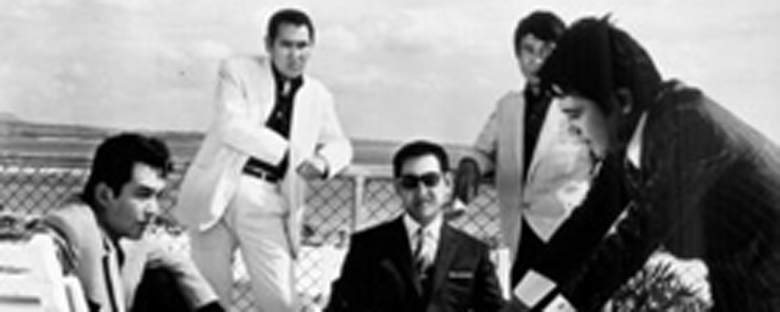Reviews
Bakuto gaijin butai
Kinji Fukasaku
Japan, 1971
Credits
Review by Matt Bailey
Posted on 02 February 2005
Source Home Vision Entertainment DVD
Related articles
Reviews: Fall Guy
You may lately have read my crowing praise for Home Vision Entertainment’s recent spate of DVD releases of films directed by Kinji Fukasaku. I was particularly keyed up about their box set edition of his Battles Without Honor and Humanity series, a high point after which all other releases might be anti-climactic. Fortunately for me, Home Vision show no signs of resting on past glory when it comes to their ongoing project to canonize Fukasaku as a major director of the last half of the twentieth century.
Sympathy for the Underdog, one of a pair of new Fukasaku DVD releases, is a film made just a couple of years before the director began the work that would become arguably the pinnacle of his career and thus is something of a transitional, minor work, but it is every bit as accomplished in style and technique as those perfect later films.
The story told in the film is very simple: Gunji, an aging yakuza, free after ten years in prison, wants to gather together the remains of his old gang to regain their place in Yokohama’s criminal underworld. After a decade away, however, there is no longer a place for Gunji, so he takes his rag-tag band of thugs to the still American-occupied island of Okinawa where control of the criminal world is still up for grabs. Gunji plans to start his bid for dominance by taking out the small gang of hoods that controls the whiskey trade. Things don’t go precisely according to plan, but Gunji succeeds nevertheless. Next up, a bigger gang with more guys and more guns. After them, however, comes an even bigger gang with ties back to Gunji’s old boss from Yokohama. It doesn’t take a clairvoyant to see that there is going to be a bloodbath at the end of this film.
Whereas Fukasaku’s Battles Without Honor and Humanity series is deeply rooted in yakuza traditions of honor and ritual (even as the post-war generation of yakuza in the films struggles to abandon those traditions), Sympathy for the Underdog is more informed by and patterned after American crime films from the 1930s and 1940s, perhaps reflecting the complex relationship of influence between the Americans and the Japanese in Okinawa at the time of the film’s production. The film features the hard-boiled voice-over recognizable from film noir and, like in the Cagney films of the 1930s, the gangsters are held accountable to no one but themselves. If the film gives the impression that it takes place in an American-colonized Japan, it is perhaps not unintentional; in addition to The Wild Bunch, one of Fukasaku’s primary influences on this film was Gillo Pontecorvo’s The Battle of Algiers. Although the Yokokama exiles’ battle is with other Japanese, the presence and influence of the massive American occupation force nearby is always conspicuous: Pepsi signs and American flags clutter every shot and everyone drinks Johnnie Walker and drives Fords and Chevys. A welcoming dance performed by traditional Fujimusume dancers appears just as foreign and exotic to the yakuza as it does to the untutored American viewer.
Though Sympathy for the Underdog feels almost quaint compared to the bloody, seething nihilism of Battles Without Honor and Humanity or even of Sympathy’s immediate follow-up, Street Mobster, the mixture of ultra-modern style and vintage themes is effective and makes it easy to see why Quentin Tarantino, whose own films often apply glossy new surfaces to tatty old genres, is such a fan of Fukasaku. Though I have not yet seen even more than a handful of the sixty-one films Fukasaku directed in his lifetime, I am firmly convinced that he was constitutionally incapable of making a bad film.
We don’t do comments anymore, but you may contact us here or find us on Twitter or Facebook.



